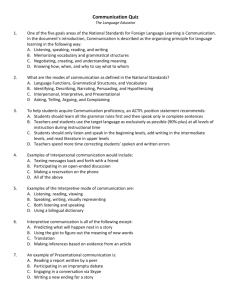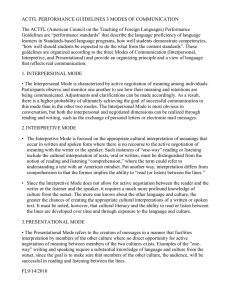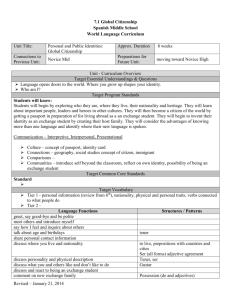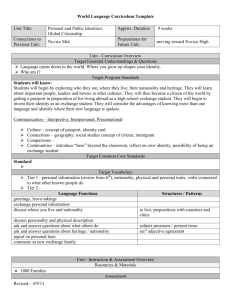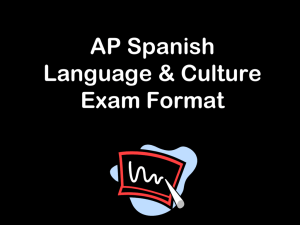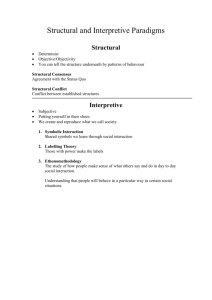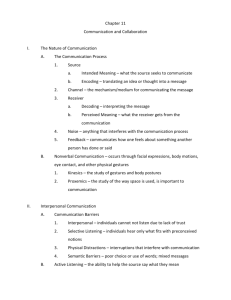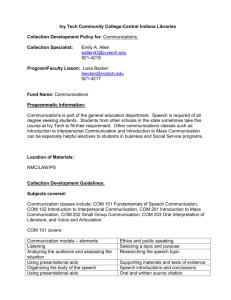Common Core and Language Learning
advertisement
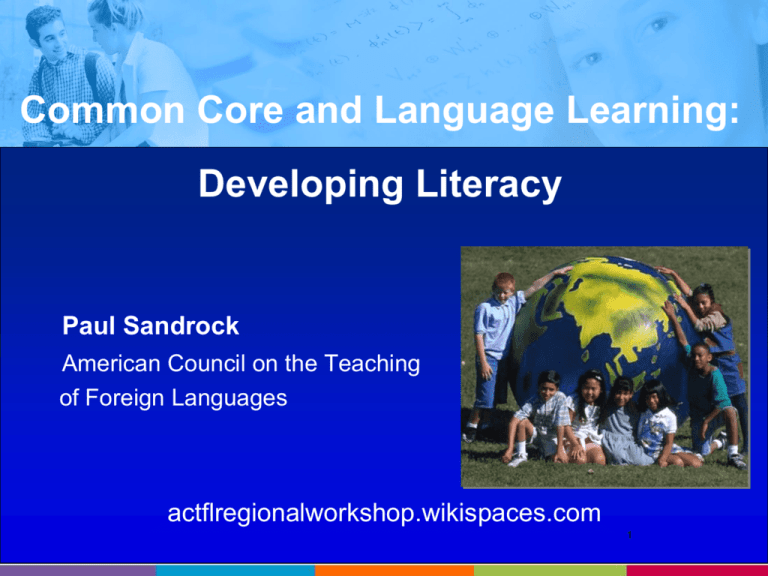
Common Core and Language Learning: Developing Literacy Paul Sandrock American Council on the Teaching of Foreign Languages actflregionalworkshop.wikispaces.com 1 21st Century Learning “This is a story about the big public conversation the nation is not having about education … whether an entire generation of kids will fail to make the grade in the global economy because they can’t think their way through abstract problems, work in teams, distinguish good information from bad, or speak a language other than English.” How to Build a Student for the 21st Century, TIME Magazine, Dec. 18, 2006 What skills are in demand? Top “most important” skills from employers: • Professionalism/work ethic & teamwork/collaboration • Communication • Knowledge of other languages • 63.3% of employer respondents believe this will increase in importance • Making appropriate health and wellness choices • Creativity/innovation • 73.6% of employer respondents project this skill to increase in importance • Currently 54.2% of employers say new hires with high school diploma are deficient in this skill http://www.p21.org/documents/key_findings_joint.pdf Are They Really Ready to Work? College and Career Readiness – and World Readiness? “Common Core Standards define the knowledge and skills students should have within their K-12 education careers so that they will graduate high school able to succeed in entry-level, creditbearing academic college courses and in workforce training programs.” (NGA & CCSSO, 2010) http://www.corestandards.org/ 4 Linking Common Core & World Languages Reading ---------------------------------- Listening Interpretive Interpersonal Presentational Writing ----------------------------- Speaking and Listening Speaking Proficiency Levels: Novice Intermediate Advanced Language http://www.actfl.org/commoncore • • • Conventions How language functions Vocabulary 5 Three Modes of Communication Interpersonal Negotiation of meaning Interpretive Interpretation Listening and Speaking Listening Reading Viewing Reading and Writing Presentational Creation of message: Consider audience, task, and purpose Speaking Writing Visually Representing 6 Overview to English Language Arts Standards College and Career Readiness (CCR) Anchor Standards for each strand: Reading (10 standards in 4 categories) Writing (10 standards in 4 categories) Speaking and Listening (6 standards in 2 categories) Language (6 standards in 3 categories) ▪ Consistent overarching targets (parallel for each grade band) Focus on Interpretive Mode 8 www.actfl.org/commoncore Crosswalk of Standards Common Core State Standards-ELA Standards for Learning Languages Reading Interpretive (Reading, Listening, Viewing) Key Ideas and Details (3 standards) Craft and Structure (3 standards) Integration of Knowledge and Ideas (3 standards) Range of Reading and Level of Text Complexity (1 standard) Common Core State Standards-ELA Standards for Learning Languages Reading Interpretive (Reading, Listening, Viewing) Key Ideas and Details 1. Read closely to determine what Interpretive Communication (Standard 1.2) the text says explicitly and to make Demonstrate comprehension of content logical inferences from it; cite specific from authentic audio and visual textual evidence when writing or resources. speaking to support conclusions drawn from the text Cultures: Practices and Products (Standard 2. Determine central ideas or themes 2.1 and 2.2) Examine, compare and reflect on of a text and analyze their products, practices, and/or perspectives development; summarize key of the target culture(s). supporting details and ideas Connections: Acquiring New Information 3. Analyze how and why individuals, (Standard 3.2) events, or ideas develop and interact Acquire information from other content over the course of a text areas using authentic sources 10 Linking Common Core & World Languages Key Ideas and Details – Across Levels Novice Students Identify main ideas in developmentally appropriate oral/visual narratives based on familiar themes and highly predictable contexts with visual or graphic support. Intermediate Students Determine the main themes and significant details on primarily familiar topics from authentic multimedia and print sources, both informational text and narratives with easily discerned storylines. Advanced Students Analyze the main ideas and significant details of discussions, lectures, and presentations on current or past events from the target culture or other content areas. 11 Key Shifts in Reading Implications for World Languages Previous State ELA Standards Focus on literature Common Core State Standards Focus on more non-fiction (informational text) Grade Literary Informational 4 50% 50% 8 45% 55% 12 30% 70% Key Shifts in Reading Implications for World Languages Previous State ELA Standards Common Core State Standards Focus on literature Focus on more non-fiction (informational text) Texts that don’t prepare students for complexity of college/career texts Reading to report/summarize content Use appropriately complex texts Most emphasis on content-specific vocabulary Give unsupported personal reactions Academic vocabulary given emphasis Reading to understand deeper meaning of what authors want to convey (inferences) Cite specific textual evidence to support conclusions drawn from the text Unit: Respecting the Environment Interpretive Assessment Task Search two websites to identify actions students in ___ are taking to respect the environment Identify evidence for each category of environmental “action” Website A Website B Conserving water Recycling Saving energy Changes in buying habits Schoolwide initiatives 14 Sample Assessment Strategies: Interpretive Mode Why can’t all young people go to school? Possible Content (Predicted) Found in What is the article? information? 1. 2. 3. 4. 5. 6. Economic reasons No secondary schools nearby Civil unrest / war Disinterest / boredom Gender issues Family reasons 1. 2. 3. 4. 5. 6. 15 Focus on Interpersonal Mode 16 Crosswalk of Standards Common Core State Standards-ELA Standards for Learning Languages Speaking and Listening Interpersonal (Speaking & Listening; Writing & Reading) Comprehension and Collaboration (3 standards) Presentation of Knowledge and Ideas (3 standards) Common Core State Standards-ELA Standards for Learning Languages Speaking and Listening Interpersonal (Speaking & Listening; Writing & Reading) Comprehension and Collaboration 1. Prepare for and participate effectively in a range of conversations and collaborations with diverse partners, building on others’ ideas and expressing their own clearly and persuasively 2. Integrate and evaluate information presented in diverse media and formats, including visually, quantitatively, and orally 3. Evaluate a speaker’s point of view, reasoning, and use of evidence and rhetoric Interpersonal Communication (Standard 1.1) Engage in conversations, provide and obtain information, express feelings and emotions, and exchange opinions. • Engage in the oral exchange of ideas in formal and informal situations. • Elicit information and clarify meaning by using a variety of strategies. • State and support opinions in oral interactions. • Self-monitor and adjust language production. • Converse in ways that reflect knowledge of target culture communities (e.g., geographic, historical, artistic, social and/or political. 18 21st Century Skills Map – Interpersonal Tasks Novice Intermediate Advanced • Students develop a • Students collaborate to • Students chat with survey to investigate retell a familiar story classmates to decide who the eating habits of and prepare to present has the most similar ideas the class, interview it to their classmates on a debate topic; the students, and resulting small groups work discuss the results to • Students exchange text together to create the main create a graph messages to determine points they will make in a who has the busiest debate • Students browse week. online recipes and • Students examine a blog work in pairs to about a news event in the change ingredients target language country; to healthier identify what new alternatives information they discover and collaborate to post a reply 19 Creating Effective Tasks to Elicit Stronger Interpersonal Performance • Create a performance task in which students have to engage in a spontaneous conversation • Make sure students have to “negotiate” with each other, not just report or tell • Consider the level you are targeting (Build on your students’ strengths in communicating) • Have students engage in a task that will push their language performance toward the next higher level 20 Unit: Respecting the Environment Interpersonal Assessment Task Spontaneous conversation, compare what you do to respect the environment with what you and your partner found out from the websites Conserving water Saving energy Recycling Changes in buying habits Focus: Places to Visit in the Region Questions in an Envelope On individual slips of paper – examples of follow-up questions appropriate to the thematic focus: • What is interesting to see? • When is a good season to visit there? • Are there many things for young people? • In bad weather, what can I do for fun? • Describe any special foods of the region • What do you like the most about the region? • Everyone in our class will enjoy the region, right? • What will our teacher say to visit or do there? 22 Interpersonal: Move from Intermediate to Advanced Range Move from: 1–3–5 Move to: You probably do these things already Language Functions Do you want to improve your language skills? Ask questions that are Asking simple (may generate 1-2 questions word answer) Ask substantive, relevant, open-ended questions that keep the conversation going Follow-up with appropriate comments and questions Draw in others to maintain the conversation Respond to what you Extending hear rather than initiating your conversation answer Provide supporting reasons, insights, and examples Use common vocabulary words, without much variation Circumlocuting Use appropriate connecting words to reflect a flow of ideas/thoughts (as you narrate) Use abstract language and more precise vocabulary Clarifying meaning Paraphrasing, you restate what you think your conversation partner said to verify your understanding Focus on Presentational Mode 24 Crosswalk of Standards Common Core State Standards-ELA Standards for Learning Languages Writing Presentational (Writing, Speaking, Visually Representing) Text Types and Purposes (3 standards) Production and Distribution of Writing (3 standards) Research to Build and Present Knowledge (3 standards) Range of Writing (1 standards) Overview to English Language Arts and Literacy Standards: Text types and Purposes Grade To Persuade To Explain To Convey Experience 4 30% 35% 35% 8 35% 35% 30% 12 40% 40% 20% Crosswalk of Standards Common Core State Standards-ELA Standards for Learning Languages Writing Presentational (Writing, Speaking, Visually Representing) Text Types and Purposes (3 standards) Production and Distribution of Writing (3 standards) Research to Build and Present Knowledge (3 standards) Range of Writing (1 standards) Common Core State Standards-ELA Standards for Learning Languages Writing Presentational (Writing, Speaking, Visually Representing) Production and Distribution of Writing 4. Produce clear and coherent writing in which the development, organization, and style are appropriate to task, purpose, and audience Presentational Communication (Standard 1.3) Present information, concepts, and ideas to an audience of listeners or readers on a variety of topics, knowing how, when, and why to say what to whom. • Retell or summarize information in narrative form, demonstrating a consideration of 5. Develop and strengthen writing audience. as needed by planning, revising, editing, rewriting, or trying a new • Self-edit written work for content, organization, and grammar. approach 6. Use technology, including the Internet, to produce and publish writing and to interact and collaborate with others Communities: Beyond the School Setting (Standard 5.1) Use the language both within and beyond the school setting. 28 Building Blocks Rosita recycles newspapers _______ where ? __________ when ? ______________ at what time? __________ with whom? _________. why? Rosita recycles newspapers at her school with her friends every Friday at noon to not use so many trees. ACTFL Webinar - Laura Terrill 29 Write 5 sentences about saving water….. Water is not free. There is not much clean water. I drink the water I need. I give water to my grass. I do not put water on the sidewalk. Because water is not free and there is not much clean water, I can only drink the water I need and also not put water on the sidewalk when I give water to my grass. ACTFL Webinar - Laura Terrill Teach transitions but and then at first however often later perhaps by the way on the contrary and briefly also still, always as, like for example in this way suddenly because especially in any case finally now ACTFL Webinar - Laura Terrill Test #1: 1. List the family members on the illustrated family tree 2. Describe what one family member looks like 3. List three professions 4. Say four things your family does on the weekend 32 Focused on Three Modes of Communication? Assessing more than vocabulary and grammar? Interpretive Look at (or listen to) information from three different host families in China/Egypt, to find out as much as you can: Where they live, how many children they have, what activities they like to do, etc. Then decide which family you would prefer to host you and list as many reasons as possible to explain why. 33 Focused on Three Modes of Communication? Assessing more than vocabulary and grammar? What can you find out about the family? Where do they live? Do they live in a house, apartment, condo, something else? How many people live together as the family? Who are they? What activities do they like to do? What else can you do during homestay with this family? Letter from Eissa Family Letter from Mizrahi Family Letter from El Nabawy Family Focused on Three Modes of Communication? Assessing more than vocabulary and grammar? Interpretive Interpersonal Look at (or listen to) information from three different host families in China/Egypt, to find out as much as you can: Where they live, how many children they have, what activities they like to do, etc. You and your partner are exchange students. It will be your first night with your host family in China/Egypt next week and you want to practice your conversational skills. You are given a picture of your own family and you will practice with your partner the kinds of questions you will ask and how you will respond. Then decide which family you would prefer to host you and list as many reasons as possible to explain why. 35 Focused on Three Modes of Communication? Assessing more than vocabulary and grammar? Interpretive Interpersonal Presentational Look at (or listen to) information from three different host families in China/Egypt, to find out as much as you can: Where they live, how many children they have, what activities they like to do, etc. You and your partner are exchange students. It will be your first night with your host family in China/Egypt next week and you want to practice your conversational skills. You are given a picture of your own family and you will practice with your partner the kinds of questions you will ask and how you will respond. The exchange program would like you to write a letter describing your family that the Chinese/Egyptian students will read to decide on their American host family. Then decide which family you would prefer to host you and list as many reasons as possible to explain why. Provide as many details as you can to describe you and your family. Include likes, dislikes and activities. 36 Make Explicit the Link of Language Learning with Common Core & 21st Century Skills From our examination of each mode of communication, what evidence would you use to convince • Administrators • Parents • Students that you are developing Common Core literacy and 21st Century Skills? 37 Engage and Empower Language Learners • Focus on real communication • Provide a rich and engaging context • Demonstrate students’ proficiency (gather evidence via performance assessments) • Ensure that we model and students practice 21st century skills so that students know they are developing college-, career-, and world-readiness 38
